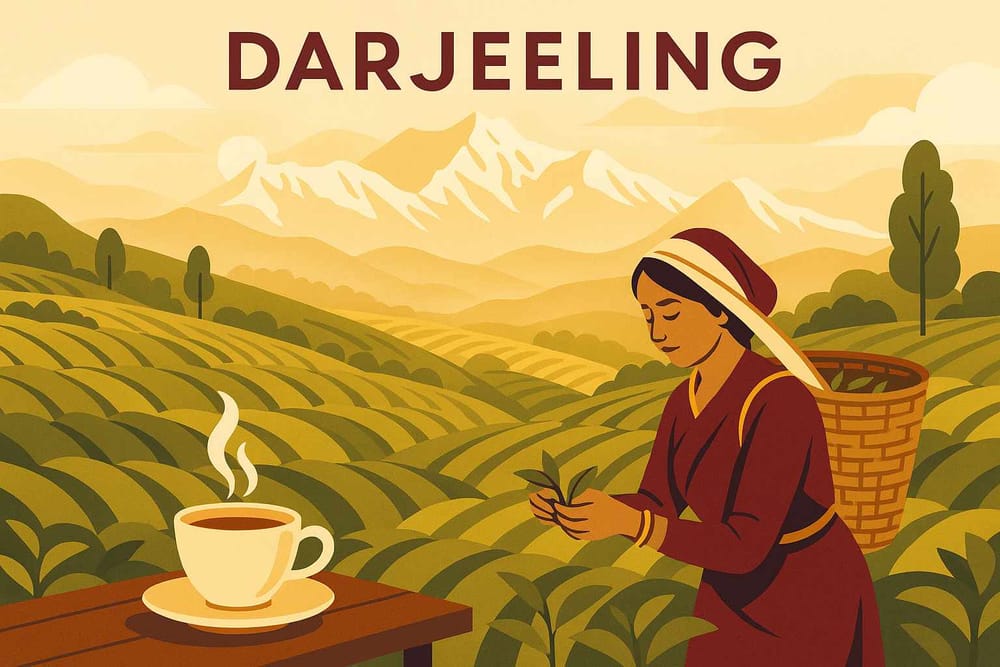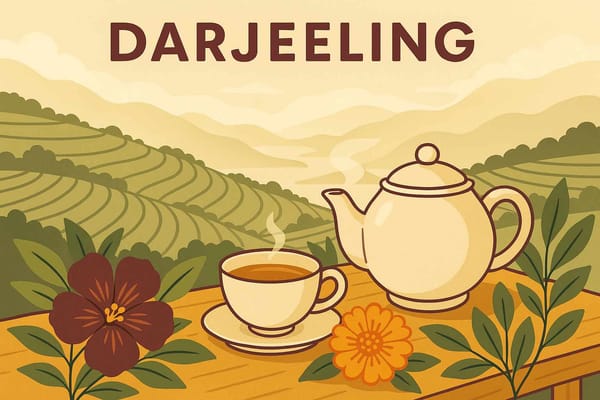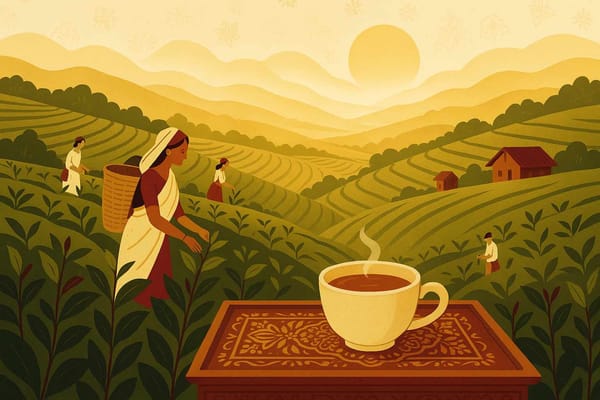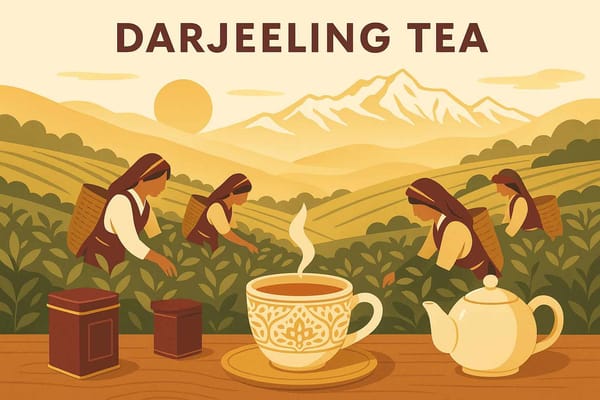
Exploring the Rich Legacy of Darjeeling Tea: History and Culture Defined
Have you ever held a cup of tea that felt like holding a story? A warmth that seeps into your hands and a fragrance that transports you to misty mountains. For me, that's what a cup of Darjeeling tea does. It’s more than just a morning beverage; it’s a conversation with history, a taste of our incredible heritage, and a moment of pure, unadulterated peace. It’s rightly called the “Champagne of Teas,” not just for its price, but for the celebration it brings to our senses.
Let’s journey together to the Eastern Himalayas, where every tea leaf whispers a tale of dedication, culture, and the magic of nature.
A Journey Back in Time: The Birth of a Legend
The story of Darjeeling tea isn't an ancient one, but it's deeply woven into the fabric of our nation's more recent history. It all began in the mid-1800s, during the British colonial era. The British were on a mission to find an alternative to Chinese tea, and their search led them to the beautiful, sloping hills of Darjeeling.
It was a gentleman named Dr. Archibald Campbell, a superintendent in Darjeeling, who first planted Chinese tea seeds in his garden in 1841. He just wanted to see if they would grow. Little did he know, he was planting the seeds of an industry that would bring global fame to this quiet corner of West Bengal. The cool climate and high altitude were perfect. By 1856, the first commercial tea gardens had sprung up, and the landscape of Darjeeling was changed forever.
The Heartbeat of the Hills: Culture, Community, and Craft
But Darjeeling tea is not just about British enterprise; it’s about the people whose sweat and skill turned those steep slopes into lush green gardens. To cultivate these estates, a large workforce was needed, and people from neighbouring Nepal, the Gorkha community, came to make these hills their home. Their lives became intertwined with the rhythm of the tea gardens – the plucking, the withering, the rolling. Their dedication is the secret ingredient in every cup.
This beautiful synergy of nature and human effort created a unique culture. The folk songs and dances of the workers often echo through the valleys, telling stories of their lives and their connection to the land. This is a powerful reminder of how our traditions are kept alive through everyday life and work, much like the rhythm of heritage found in folk music and dance across India.
Unveiling the Secrets of the 'Champagne of Teas'
Many wonder what gives Darjeeling tea its almost mythical status. Why is it revered by connoisseurs around the world? The magic lies in a combination of factors that are impossible to replicate anywhere else.
The unique character of this Himalayan brew comes from its high-altitude home. Grown at 6,000 to 7,000 feet, the tea plants are bathed in misty clouds and cool air. This unique climate, along with the acidic soil, imparts a delicate, fruity, and floral flavour known as "muscatel" – a taste so distinct and prized that it has earned the tea its famous title, the "Champagne of Teas." Just like champagne from a specific region in France, true Darjeeling tea can only come from this one special place.
You might also hear people talk about different "flushes." These aren't different types of tea plants, but different harvest seasons, each offering a unique experience:
- First Flush (Spring Harvest): This is the first harvest after the winter dormancy, usually from late February to April. The tea is light, floral, and has a fresh, vibrant taste. It's often the most sought-after and expensive flush, truly a taste of spring in the mountains.
- Second Flush (Summer Harvest): Harvested from May to June, this flush produces a more full-bodied tea. This is where the famous 'muscatel' flavour is most pronounced, giving the tea a rich, amber colour and a complex, fruity aroma.
- Monsoon and Autumn Flush: Teas harvested during the monsoon and autumn seasons have their own distinct characters, often stronger and bolder. They are perfect for those who enjoy a more robust cup of tea.
This incredible quality comes at a price, and there's a good reason for it. The production is limited, the plucking process is incredibly labour-intensive (only the tenderest "two leaves and a bud" are picked by hand), and its status as a Geographical Indication (GI) product protects its authenticity, ensuring that what you're drinking is the real deal.
Brewing the Perfect Cup: A Moment of Ritual
To truly appreciate Darjeeling tea, brewing it correctly is essential. Think of it as a small ritual to honour the journey of the leaves. Always use fresh, clean water and bring it to a near boil, around 85-90°C. Using water that is too hot can scorch the delicate leaves and make the tea taste bitter. Let the leaves steep for about 3-4 minutes, allowing them to unfurl and release their full flavour. And as you sip, you’re not just hydrating; you’re also enjoying a host of health benefits, as this tea is rich in antioxidants that boost immunity and promote heart health.
Just as a simple cup of tea can become a cherished ritual, many of our traditions are filled with practices that bring peace and meaning to our lives. The careful preparation of Darjeeling tea reminds us of the cultural significance found in detailed preparations for celebrations like Gangaur Ghat, where every step has a purpose.
A Legacy in Every Sip
So, the next time you pour yourself a cup of this golden liquid, take a moment. Inhale its beautiful aroma. Let the warmth spread through you. Remember the misty mountains of Darjeeling, the generations of workers who have tended the gardens, and the incredible journey it has taken to reach your home. By choosing authentic Darjeeling tea, you are not just buying a product; you are honouring a legacy and supporting a culture that is a true treasure of India.
Stories like these, steeped in culture and history, are what we at Bhaktilipi love to share. Our traditions are filled with countless tales of faith, heritage, and the simple things that give life meaning.
About Bhaktilipi
Bhaktilipi is your online destination for authentic devotional literature and stories. We focus on preserving timeless traditions while presenting them in ways that resonate with today’s readers. Whether you're looking to deepen your spiritual knowledge or explore rituals and practices, Bhaktilipi offers reliable content to guide you.
By subscribing to our newsletter, YouTube channel, and following us on social media, you gain access to enriching articles, videos, and updates about devotional practices and our shared cultural heritage. Stay connected with us to explore more stories that touch the soul.
Connect with us:
A passionate group of people dedicated to preserving India's knowledge of Dharma, Karma, and Bhakti for ourselves and the world 🙏.
Comments
Related in

Darjeeling Tea Secrets: History-Varieties-Brewing Explored
There's a certain magic that hangs in the misty air of the Darjeeling hills. It’s a feeling of peace, of being close to nature, and of touching a history that is as rich and layered as the soil itself. This very magic is captured in a cup

Exploring the Rich History and Unique Flavors of Darjeeling Tea: A 2025 Guide
Imagine this: a gentle mist rolling down the majestic Himalayas, the air crisp and clean, and in your hands, a warm cup of tea. With the very first sip, you’re not just tasting a beverage; you're experiencing a story—a legacy that has travelled through time from

Exploring the Rich History and Unique Flavors of Darjeeling Tea- A 2025 Guide
Have you ever held a cup of warm tea that feels like it holds the secrets of the mountains? A brew that smells of mist, sunshine, and wild blossoms all at once? For me, and for millions of Indians, that experience is perfectly captured in a cup of Darjeeling tea.
